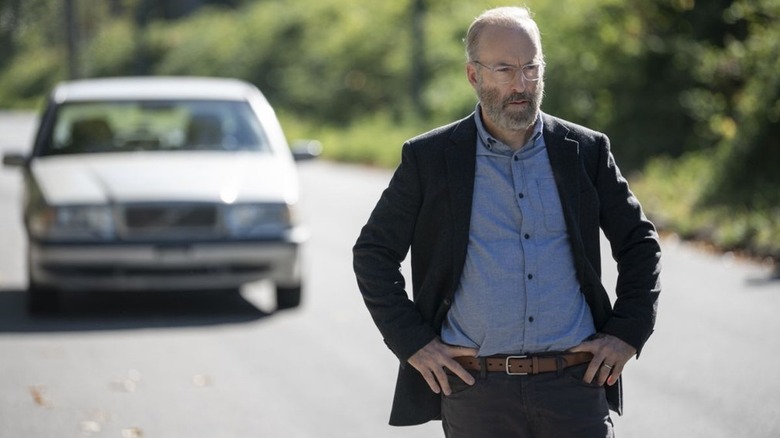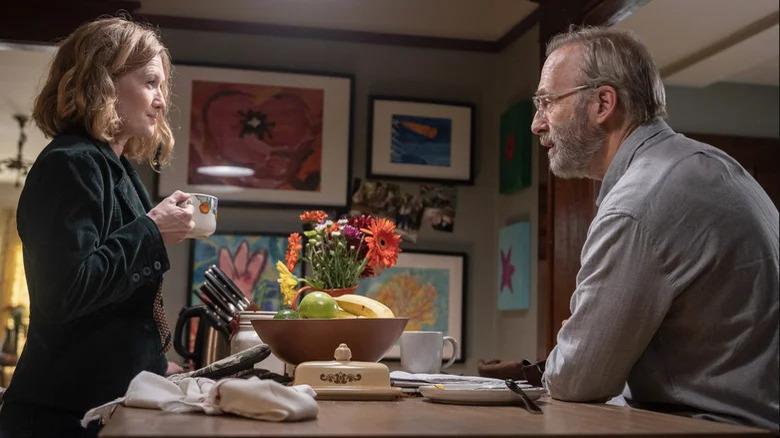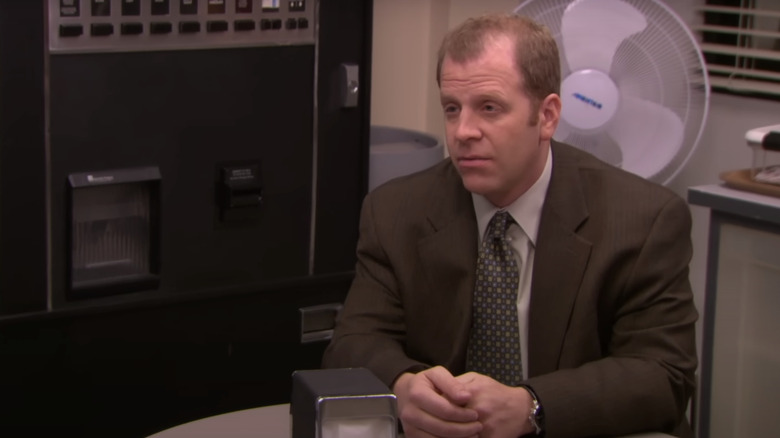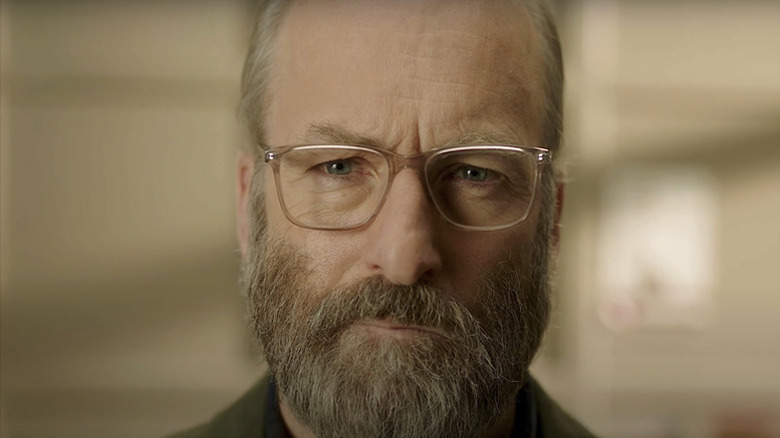Lucky Hank Showrunners On Casting Bob Odenkirk And The Show's Ineffable Tone [Exclusive Interview]
Bob Odenkirk didn't waste much time before jumping into his next project after "Better Call Saul." His latest series is another AMC show called "Lucky Hank," and this one features Odenkirk as the titular Hank, a professor at a mediocre Pennsylvania college who, as this recent teaser points out, specializes in "minor strife and significant irritation."
The show is based on Richard Russo's 1997 book "Straight Man," and is a character study of a man going through a mid-life crisis. The eight-episode season comes to us from co-showrunners Paul Lieberstein ("The Office") and Aaron Zelman ("The Killing"), and it will likely be a series that defies being categorized into any specific subgenre (though dramedy is what most folks will likely call it).
"We don't know how to define it, but we know it when we see it," Zelman explained to me during the Television Critics Association winter press tour, when asked about finding show's tone. Earlier on in my discussion with the co-showrunners, Lieberman also admitted that the series' fresh approach is a gamble, saying the project is "an opportunity to either crash and burn or really put out a unique show."
The two obviously hope it's a winner (as do the execs at AMC), and took the time to talk with me about their approach to adapting the series, including where they pulled from their own lives, how they developed the show's wide array of complex characters, and much more.
Note: This interview has been lightly edited for clarity and brevity.
'By the time I talked to Bob, he was a 100% in. He loved this character and wanted to do it'
One of the things I really liked about the first episode is how the tone is so unique. I'm sure a lot of people will use the word "mash-up" for it. When you were working on the show, both in production and in editing, was there a mantra or a touchstone you used to try to get that tone right between the comedy and the drama?
Zelman: [laughs] I wish.
Lieberstein: Yeah, we're constantly finding it and we need a guide like that. It is a daily discussion about staying on tone. And what is it? What is our tone? It's one of these things I think we don't often know until it works. Like, "Oh yeah, no, no, no, that's good. That's entertaining."
Zelman: We don't know how to define it, but we know it when we see it. It sounds like a joke, but like Paul said, we're always —
Lieberstein: We couldn't point to another show and say, "Oh, we're doing that. We're doing a version of that." Which was hard to get on the same page with all the writers, and actors, and worried people. It constantly worries people.
Zelman: Yeah. People get very nervous about that.
Lieberstein: But I feel like it's an opportunity to either crash and burn or really put out a unique show.
Absolutely. And part and parcel with that, did you have a specific pitch to [series lead Bob Odenkirk] to get him hooked?
Zelman: Oh, that's an interesting question. I mean, no, not really. He read the script.
Lieberstein: By the time I talked to Bob, he was a 100% in. He loved this character and wanted to do it.
He just read the script and was like, "Yes, please?"
Zelman: I would say the only thing that he questioned and wondered about was, I think the original script that he read was about 38 pages long. And he said, "Now this couldn't be like a 22-minute half-hour, right? Or is it?" And we said, "No, we don't see it that way." But we also didn't exactly know where it would go.
Lieberstein: For a long time, it was intended to be a true 30-minute show for streaming.
Zelman: So I think there was a little confusion with Bob there and then we soon said, "No, no, this is 30 minutes. This is 34 minutes, or however it would play, and that's what it needs to be." And I think something clicked for Bob and he said, "I get it. Okay, this is its own thing, it's going to have its own life." And then we ended up expanding a little more to meet the hour-long format of AMC.
It didn't seem like an hour. That's a good thing.
Zelman: Yeah, people want to define it — is it a half-hour, or an hour? We had a lot of back and forth asking, "Do we have to restructure this whole thing?" And in the end, we're like, "No, let's just add a little bit more to these characters, and we think it'll sustain because there's enough there." And hopefully we were right.
'Sometimes it felt more ensemble, sometimes it felt more like a show about a marriage'
In that vein, one of the things I love about the first episode — this isn't really spoilery because it's hinted at in the teaser — but when Hank faces some career setbacks, he reacts by smiling. Maybe this says something more about me than about the show, but I was like, "Oh, I really get that. He sees things crashing and burning, but maybe he loves it." Is that something intentional you're going for there?
Lieberstein: Yeah, it was impossible for him to make a decision on his own. And I feel that way in life so many times. My wife and I wanted to move, but we thought we were one fire season away from it. If there was a fire, we probably would've done it, but no fire came.
Zelman: It rained.
Lieberstein: It rained.
Yup, we got rain instead. It's one or the other here, for sure.
Lieberstein: That was it. We stayed.
The other thing I liked about the show is that it has a balance. Obviously, Bob's Hank is the title character, but Mireille Enos as his wife, Lily, gets a lot of development in the first episode. When you were putting the show together, how did you approach doling out the time for each character?
Lieberstein: As we were constantly trying to discover the tone of this thing, sometimes it felt more ensemble, sometimes it felt more like a show about a marriage. We knew that his wife had to be more than she was in the book because we intended to go past, hopefully, one season.
Zelman: And we liked the idea of just building that character up. In the book, she kind of disappears.
Lieberstein: It makes him more interesting, and she became an interesting person to follow as we started to learn more.
And without getting into spoilers, is the relationship between Hank and Lily a central focus of the series?
Zelman: The way we often talked about it was, it's basically a good solid marriage but they're going through something. And the more we explored it, the more they were going through something, and it ended up getting a little messier than we even anticipated. But I think we felt it was all supported by what these characters are going through and what we wanted to put them through. And it just kind of makes it a more interesting exploration of a marriage in middle-age. We were drawing from our own experiences sometimes and we wanted to explore that.
'We're both very interested in what the actors bring to it and we both believe in writing to their strengths'
I want to talk more about the faculty because I think they're all great. I've been to college, I went to grad school for a degree I'll never use, and there are definitely professors on the show that reminded me of some of the professors I've had in my life. Can you talk me through the process of how you developed each of them?
Lieberstein: Well, we did really start with the book, with Richard Russo's characters. He created a very interesting department and they all challenged Hank in a different way. And then we did some adapting, which was step two, where we started to base them on some people we knew. And then step three was when the actor comes in and then the character gets reinvented one last time. So there's not a lot of resemblance in the end.
Zelman: We're both very interested in — I mean obviously Paul's an actor too, in addition to being a writer. So we're both very interested in what the actors bring to it and we both believe in writing to their strengths and letting them show us what direction to go.
Is there any particular actor or character you changed in a significant way once you cast the person?
Zelman: Well, gender, ethnicity, a lot of things got changed because we found it more interesting in this day age.
Lieberstein: And then as we started to see what people could do, we adjusted the characters as well. There was the character of Meg, who started off as a much more brash character and just discovered that the actress came alive when she was just a little sweeter and we made the necessary adjustment for that.
And Paul, I have to ask — Aaron mentioned you're also an actor, and obviously in "The Office" you played Toby.
Lieberstein: I did.
Is there any chance we'll see you in a potential role or in a cameo or anything like that?
Lieberstein: I don't show up in season 1, but perhaps season 2. But I did cast my buddy, Oscar Nuñez [who plays accountant Oscar Martinez in "The Office."] He's fantastic. It's good to work with him.
'Everything Hank does is somehow connected to his father'
The show also seems to be a balance between Hank's work life and personal life, and how they're both kind of dysfunctional families in their own way. Was that something intentional you worked towards when you were working on the scripts, in terms of showing the parallels between them or having them play against each other at all?
Lieberstein: We tried to make it one life. I think some shows really fail when it's the workplace and home life, and it's almost like trying to create two shows and you have to have magic in both places. And I've seen shows just where one of them doesn't work and one slowly shrinks and it's like, "Oh, we're just not going home anymore." But we tried to think of it as one place. A life. And these are the people in Hank's life.
Zelman: And we drew from our own experiences — you're in the writers' room and have your workplace, and then you have your home family, and many of us spend more time with our work families than at home. We were just drawing from our own experiences a lot and how those are reflected in each other and how work can imprint on family and vice versa.
Without getting into specifics, we get hints of Hank's father in the first episode. Can you tease a little bit about how Hank and him interact, potentially, through the course of the show?
Zelman: We talked about that a lot.
Lieberstein: So something Richard Russo [author of "Straight Man"] told us when we talked to him early on was, "Everything Hank does is somehow connected to his father." And that was very instructive to us.
Zelman: When we actually did our first big pitch to AMC about the whole season and what we wanted to do, after figuring out in the writers' room for a little while, that became our thematic glue. We said, "We want to explore the way that relationships people have with their parents run through their entire lives, and it doesn't end until you're dead."
Lieberstein: Yes. We've talked a lot about that. We both find it interesting, humiliating at times, that we are still reacting to scars from 45 years ago or more, and really wanted to explore that with the dad. We do more with the father than the book does. We bring him in.
"Lucky Hank" will premiere on AMC on Sunday, March 19 on AMC and AMC+.




